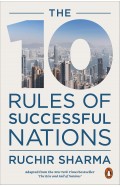What Went Wrong with Capitalism
By: Ruchir Sharma
-
Rs 5,665.50
- Rs 6,295.00
- 10%
You save Rs 629.50.
Due to constant currency fluctuation, prices are subject to change with or without notice.
A radical examination by a leading financial analyst, commentator and investor of the ills of capitalism and how they can be fixed
What went wrong with capitalism? Ruchir Sharma’s explanation is unlike any you have heard before. Progressives are partly right when they mock modern capitalism as “socialism for the rich,” but what really happened in recent decades is that government in developed nations expanded in just about every measurable dimension, from spending and regulation to the sheer scale of its rescues each time the economy wobbled. The result, Sharma says, is “socialized risk,” expensive government guarantees, for everyone―welfare for the poor, entitlements for the middle class, and bailouts for the rich.
Voters say they are disillusioned with capitalism, but a system so distorted by government interventions is a dysfunctional version of free market ideals. As a result, productivity and economic growth have slowed sharply, shrinking the pie for everyone and stoking popular anger. Since these flaws developed as the government expanded, building an even bigger state will only double down on what’s gone wrong. The answer Sharma offers is a series of seven fixes to restore the balance between state support and free markets and lay the path to a more prosperous and happier future.
A radical examination by a leading financial analyst, commentator and investor of the ills of capitalism and how they can be fixed
What went wrong with capitalism? Ruchir Sharma’s explanation is unlike any you have heard before. Progressives are partly right when they mock modern capitalism as “socialism for the rich,” but what really happened in recent decades is that government in developed nations expanded in just about every measurable dimension, from spending and regulation to the sheer scale of its rescues each time the economy wobbled. The result, Sharma says, is “socialized risk,” expensive government guarantees, for everyone―welfare for the poor, entitlements for the middle class, and bailouts for the rich.
Voters say they are disillusioned with capitalism, but a system so distorted by government interventions is a dysfunctional version of free market ideals. As a result, productivity and economic growth have slowed sharply, shrinking the pie for everyone and stoking popular anger. Since these flaws developed as the government expanded, building an even bigger state will only double down on what’s gone wrong. The answer Sharma offers is a series of seven fixes to restore the balance between state support and free markets and lay the path to a more prosperous and happier future.
Zubin Mehta: A Musical Journey (An Authorized Biography)
By: VOID - Bakhtiar K. Dadabhoy
Rs 892.50 Rs 1,050.00 Ex Tax :Rs 892.50
Extreme Economies - Survival, Failure, Future - Lessons from the World's Limits
By: Richard Davies
Rs 2,695.50 Rs 2,995.00 Ex Tax :Rs 2,695.50
MBS - The Rise to Power of Mohammed Bin Salman
By: Ben Hubbard
Rs 2,605.50 Rs 2,895.00 Ex Tax :Rs 2,605.50
Citizen: My Life After the White House
By: President Bill Clinton
Rs 6,745.50 Rs 7,495.00 Ex Tax :Rs 6,745.50
The Origins of Political Order From Prehuman Times to the French RevolutioN
By: Francis Fukuyama
Rs 4,045.50 Rs 4,495.00 Ex Tax :Rs 4,045.50
Manning Up: How the Rise of Women Has Turned Men into Boys
By: Kay Hymowitz
Rs 845.75 Rs 995.00 Ex Tax :Rs 845.75
The Obama Syndrome: Surrender At Home War Abroad
By: Tariq Ali
Rs 1,100.75 Rs 1,295.00 Ex Tax :Rs 1,100.75
The Quest For Meaning: Developing A Philosophy Of Pluralism
By: Tariq Ramadan
Rs 1,185.75 Rs 1,395.00 Ex Tax :Rs 1,185.75
Extreme Economies - Survival, Failure, Future - Lessons from the World's Limits
By: Richard Davies
Rs 2,695.50 Rs 2,995.00 Ex Tax :Rs 2,695.50
MBS - The Rise to Power of Mohammed Bin Salman
By: Ben Hubbard
Rs 2,605.50 Rs 2,895.00 Ex Tax :Rs 2,605.50
Citizen: My Life After the White House
By: President Bill Clinton
Rs 6,745.50 Rs 7,495.00 Ex Tax :Rs 6,745.50
The Carpenter - A Story About the Greatest Success Strategies of All
By: Jon Gordon
Rs 10,345.50 Rs 11,495.00 Ex Tax :Rs 10,345.50
Miss Marple and Mystery - The Complete Short Stories
By: Agatha Christie
Rs 3,775.50 Rs 4,195.00 Ex Tax :Rs 3,775.50
Quantum Leaps How Maths Drives Scientific Progress
By: Hugh Barker
Rs 4,315.50 Rs 4,795.00 Ex Tax :Rs 4,315.50
The Way of the Strangers - Encounters with the Islamic State
By: Graeme Wood
Rs 2,205.75 Rs 2,595.00 Ex Tax :Rs 2,205.75
Calm AF: Laid-Back Advice for Getting the Better of Anxiety
By: Sam Baxter
Rs 2,065.50 Rs 2,295.00 Ex Tax :Rs 2,065.50
The Barcelona Complex - Lionel Messi and the Making--and Unmaking--of the World's Greatest Soccer Club
By: Simon Kuper
Rs 2,800.75 Rs 3,295.00 Ex Tax :Rs 2,800.75
Spy Secrets That Can Save Your Life - A Former CIA Officer Reveals Safety and Survival Techniques to Keep You and Your Family Protected
By: Jason Hanson
Rs 3,055.75 Rs 3,595.00 Ex Tax :Rs 3,055.75
The Journey of Humanity: And the Keys to Human Progress
By: Oded Galor
Rs 2,515.50 Rs 2,795.00 Ex Tax :Rs 2,515.50
The Greatest Self-Help Book (Is the One Written by You) - A Journal
By: Vex King
Rs 4,135.50 Rs 4,595.00 Ex Tax :Rs 4,135.50
Zubin Mehta: A Musical Journey (An Authorized Biography)
By: VOID - Bakhtiar K. Dadabhoy
Rs 892.50 Rs 1,050.00 Ex Tax :Rs 892.50
Extreme Economies - Survival, Failure, Future - Lessons from the World's Limits
By: Richard Davies
Rs 2,695.50 Rs 2,995.00 Ex Tax :Rs 2,695.50
MBS - The Rise to Power of Mohammed Bin Salman
By: Ben Hubbard
Rs 2,605.50 Rs 2,895.00 Ex Tax :Rs 2,605.50
Citizen: My Life After the White House
By: President Bill Clinton
Rs 6,745.50 Rs 7,495.00 Ex Tax :Rs 6,745.50

















-120x187.jpg?q6)









-120x187.jpg?q6)
























